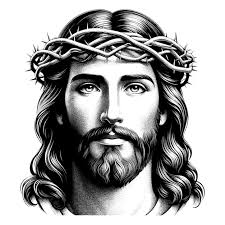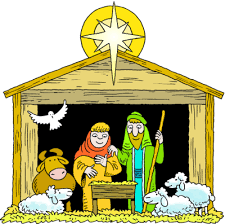John 1:14 – And the Word became flesh and dwelt among us, and we have seen his glory, glory as of the only Son from the Father, full of grace and truth.
The Word became flesh: John has devoted the opening segment of his gospel to proving that Jesus the Messiah is one with God the Father and God the Spirit; he is divine.
 He now goes on to show that the Word/Speech was also human; the God of all creation allowed himself to be born in a human body. By the power of Holy Spirit, he was birthed through the body of the virgin Mary (Luke 1:30-35, Matthew 1:23). This was predicted extensively in the scriptures – Genesis 3:15, Isaiah 7:14, Isaiah 53, etc.
He now goes on to show that the Word/Speech was also human; the God of all creation allowed himself to be born in a human body. By the power of Holy Spirit, he was birthed through the body of the virgin Mary (Luke 1:30-35, Matthew 1:23). This was predicted extensively in the scriptures – Genesis 3:15, Isaiah 7:14, Isaiah 53, etc.Here again, we find that John makes a statement that is so simple anyone can understand it, and yet so profound, even the most mature believer could meditate on it for years (and the scholars could write millions of words about it)!
Why does John use the term 'flesh'? Do you find that odd? Why wouldn't he say the Word was made 'man'?
The answer is that the term 'man' implies a body that houses a sinful, corrupt human nature. But Jesus was neither corrupt nor sinful. His divine nature was not transformed into human nature when he became a man. Instead, as we have noted above, he remained divine but fused that divinity with a soul and a body when he walked the earth. If you wish to study this concept further, please look around for other sources. As mentioned above, scholars have written thousands of pages to try and explain the mystery of this divine truth.
Rather than trying to fully explain this concept, let's just appreciate it - the God of the universe, the one who created all things, left the glory and splendor of heaven and permitted himself to be limited by a body of flesh, for the purpose of restoring fellowship with mankind!
And dwelt among us: The literal interpretation used here would be 'tabernacled' among us. Think back to what you learned in the Old Testament. The Israelites constructed a temporary dwelling place for God, called the tabernacle. At times, God's glory and presence (his Shechinah glory) was manifested in that place (Exodus 40:34-35, I Kings 8:10-11, Ezekiel 10:4). John uses this expression to describe the incarnation – the manifest presence of God condescended to dwell in a tabernacle or temple of flesh.
What else do we know about the tabernacle?
It was a temporary structure. 'Tabernacle' is never used to signify a lasting structure or habitation. In the same way, the body of flesh that Jesus dwelt in was only a temporary residence for his eternal divinity.
The Old Testament feast of tabernacles or feast of booths was a celebration held in temporary structures. This points to the fact that during his time on earth, Jesus celebrated or enjoyed fellowship with his disciples. He lived, ate, worked, and conversed with them for several years. During this time, he provided the fullest proof of his divinity (the working of miracles) but yet the clearest proof of his humanity.
And we have seen his glory: Though he was housed in a body of flesh, the divine nature and glory of Christ were evident to anyone who looked for them. His divine glory was evident at the transfiguration, in the miracles her performed, in his suffering during at the Garden of Gethsemane and the cross, and in his resurrection and ascension. This glory was further proof that God had come in human form.
Glory as of the only Son from the Father: In our culture, Jesus would be referred to as an 'only child'. This means that he is the only true son of God the Father (we are the adopted sons and daughters of God, born again through the Spirit). He is the only person born of a woman whose human nature did not come by the ordinary means of birth. Instead, he carried the divine nature given to him by his true Father – God. As such, he is above every man, angel or other created being (Hebrews 1:1-5). His glory and majesty are equal to God, because he IS God.
Full of grace and truth: This phrase is a very rich and full; we could meditate on just this one aspect of Christ all day long!
Grace refers to the love and mercy of God which he exhibited by sending a redeemer to save us. Truth refers to the revelation and fulfillment of the plan of salvation. Until the time that Christ was incarnated, the promise of redemption/salvation was just that – a promise; a future reality that millions and millions of people looked for. Jesus was the fulfillment of the promise made under the old dispensation of the law.
John 1:15 – (John bore witness about him, and cried out, "This was he of whom I said, 'He who comes after me ranks before me, because he was before me.'")
The event described in this verse probably occurred at the time when Jesus made his first appearance among those who came to be baptized by John the Baptist. As we mentioned in our introduction, many scholars believe that John the apostle was a follower of John the Baptist before he met Christ. Therefore, he could be relating an event that he himself saw.
This quote from John the Baptist could be paraphrased this way: "It is proper that Jesus should be honored and respected above me, because he is a person superior in nature to me (he is divine). Though he was born (in the flesh) after me, he actually existed before me (because he is both divine and eternal)."
John 1:16 – For from his fullness we have all received, grace upon grace.
Back in verse 14 the apostle John said that Jesus was full of grace and truth. He now points out that every believer receives from that abundance.
Think of it this way: Suppose you were starving, you went into a restaurant, and you were seated at an enormous empty table that would seat 10 people. A server came up and gave you a menu. But before you could even see all of the choices, the manager showed up with a platter overflowing with a huge steak.
You are happy and thankful beyond words! But after only two or three bites of meat, the manager returns with a plate of potatoes. Then he brings salad. Then bread and butter. Then two different kinds of vegetables. Then some coleslaw. Then a plate of different fruits. Next thing you know, the table is completely full. Every kind of food you could ever want is on that table. There is an abundance - more than you could ever eat.
Or what about this: You are in your garage, trying to restore your broken down old car. But you are missing the tools you need, so you call the local parts store. The manager sends a truck to your house and delivers a torque wrench. You are delighted. But before you can even open the hood of the car, he also places a set of screwdrivers on your workbench. As you are considering the screwdrivers, he adds a socket set. And some ramps. And a hammer. And a cordless drill. And an air compressor. Before you know it, your garage is full. Every kind of tool you could ever want or need is in your garage.
These are examples of 'grace upon grace'. In both scenarios, Jesus is the manager. He has complete authority over the vast fountain of resources that God (the owner) possesses.
Now, let me ask you this: Does the phrase 'grace upon grace' sound stingy to you? Of course not! The phrase includes an element of abundance – it isn't just a single instance of grace, it is layer after layer after layer of added grace. It includes things that you don't even know that you need yet!
By definition grace is divine favor; it is a gift from God that we do not deserve or earn by works. It is also true that the fullness of the supply is constant – God never runs out. Yet, some Christians live without an abundance of grace. They don't seem to have all that they need. Why is that? It is because the power to receive grace increases with use or diminishes with neglect, depending on what we do with it:
Matthew 13:12 - For whosoever has, to him shall be given, and he shall have more abundance: but whosoever has not, from him shall be taken away even what he has.
Grace upon grace begins with salvation, but also includes wisdom, love, the ability to live a holy life, provision, protection, power, open doors, the ability to forgive, creativity, strength, peace, sanctification and many, many other things. It encompasses anything and everything that you need as a child of God.
What do you need? A plate of provision? A funnel of forgiveness? The oil of joy? Ask the Lord for it, then begin to use what is already at your disposal, no matter how small it seems. In due time, you will find grace upon grace. You will come into what you need.
The expression 'grace upon grace' also implies superiority. The grace given to Christians under the gospel is superior and more abundant than that given under the Law. So let's rejoice and be glad that we live in the gospel dispensation. And let's exercise the grace we have, that we may obtain more!
John 1:17 – For the law was given through Moses; grace and truth came through Jesus Christ.
Here John calls attention to the difference between Moses and Christ.
Think back to what you know about the giving of the Law. When the children of Israel left Egypt, God brought them to Mt Sinai. There, the people were to meet him at the mountain. God showed up in a thick cloud accompanied by darkness, thunder, lightning and an earth quake. The people had been warned not to even touch the mountain, or they would perish. Great fear was upon all of the people.
Moses climbed to the top of the mountain to meet with God. At that time, God gave him the law to pass on to Israel. Thus, the law truly did come from God to Israel through Moses.
The law had value. It was the covenant between God and Israel; they were his chosen people who enjoyed the highest level of God's favor, protection and communion that was possible at the time. The Law pointed out sin. The Law, by its rites and ceremonies, pointed to the future dispensation of grace. It contained types and shadows of the greater future covenant, when the Messiah would come and make atonement for sin once and for all.
So while the law did a number of good things, it was still limited. Its laws and rites were actually a burden to those who had to live by them. Furthermore, The Law had no power to save or redeem from sin. I think it can best be described as a precursor to grace – it effectively established that you sinned, and it put you under a sentence of death and condemnation. Then it pointed to the one who could actually redeem you, the coming Messiah.
Hebrews 10:1 - For since the law has but a shadow of the good things to come instead of the true form of these realities, it can never, by the same sacrifices that are continually offered every year, make perfect those who draw near.
By contrast, Jesus the Messiah came to earth bringing or exhibiting both grace and truth.
 He did not come with thunder and earthquakes, striking terror into his followers. He came meekly and mildly, as a baby born in a manger. He came as a man; as the Son of God in human form conversing and teaching his disciples by doctrine and example. The burdens of the law were abolished under the gospel when Jesus made permanent atonement for our sin. In exchange, we are to perform the reasonable service of loving God and our neighbors.
He did not come with thunder and earthquakes, striking terror into his followers. He came meekly and mildly, as a baby born in a manger. He came as a man; as the Son of God in human form conversing and teaching his disciples by doctrine and example. The burdens of the law were abolished under the gospel when Jesus made permanent atonement for our sin. In exchange, we are to perform the reasonable service of loving God and our neighbors.
So while those under the law had the promise of what was to come, those under the gospel can actually experience grace and forgiveness!
Therefore we can say that Jesus brought truth. This truth stands in opposition to both pagan beliefs and the law because it is the substance or reality of all those things prefigured by the law.
John 1:18 – No one has ever seen God; the only God who is at the Father's side, he has made him known.
How does the apostle John use the word "seen" in this verse? He is not denying that Moses (and others) saw manifestations of God at different times (Judges 13:22, Exodus 24:9-10).
The word 'seen' is used in the sense of knowing or being intimately acquainted with. John is pointing out that Jesus, the Son of God who existed with God before the world was formed, clearly knew his Father. Jesus had an intimate knowledge of God which neither Moses nor any other person ever had.
Since Jesus alone is intimately acquainted with God in this way, he is the only one qualified to reveal the will, nature and purposes of God to mankind. The fullest revelations of who God is and what he plans to do are revealed in Jesus Christ and the gospel message. This work is further carried on by both the written word and Holy Spirit.
Let me give you some encouragement:
Do you realize just how much God loves you? He sent his only Son to die for you! And Jesus was on board with that plan, despite the fact that he had to pay the price for your sin! What a wonderful topic of meditation this week as we celebrate the Christmas season!
Let me give you some relief:
As Jesus revealed, there is nothing you can do that he cannot or will not forgive!
Even though you may have stumbled or fallen, life isn't over yet! The only way Satan can have victory over you, is if you quit or give up. So repent, change your ways, and get back in the game (Proverbs 24:16).
Let me give you some strength:
Do you need a boost in your spiritual walk this week? Then meditate on the first chapter of the gospel of John. Let your mind consider all that God has done just for the purpose of making himself know to YOU and fellowshipping with YOU. You will discover that he you are so precious to him, he was willing to give his very best to reach out to you.


